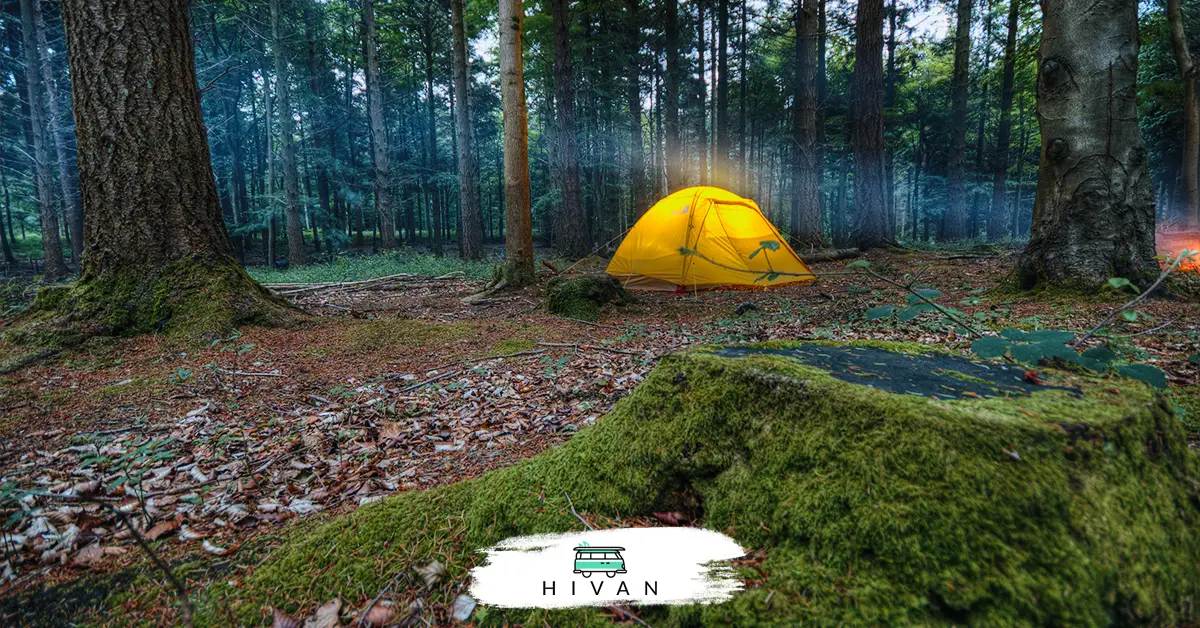Hi-van is supported by its audience. When you purchase using our links, we may earn an affiliate commission (no added cost to you). Learn more
If you’ve ever gone camping, you know that a tent is a critical piece of equipment. It provides shelter from the elements and a covered place to sleep at night. But will a tent protect you from critters and animals in the wild?

A tent will protect you from animals like snakes and insects. However, tents don’t provide good protection from larger animals like bears or cougars. Larger, more sophisticated animals can easily enter a tent that attracts them, such as one with food.
The rest of this article will discuss some other important things about whether a tent will protect you from animals, such as which types of tents are safer and how you can protect yourself from animals.
What Does a Tent Protect Campers From?
A tent protects campers from weather elements like rain and snow. It also offers campers critical protection from the wind, which can be dangerous in cold temperatures. While tents haven’t been proven to protect campers from larger animals, they’re good at deterring smaller ones.
A tent that’s constructed and sealed correctly will keep most insects, spiders, and snakes out. You can also rely on a tent to deter other small animals, like possums, birds, and raccoons. These small animals are unfamiliar with tents. Therefore, a tent can become an obstacle to getting what these animals want, such as food or shelter.
Tents can also keep away small rodents like rats and mice. Although small rodents may not seem particularly dangerous in the wilderness, they can easily chew through your belongings like sleeping bags, clothing, and shoes, so it’s crucial to keep them away.
Different Types of Tents
Tent technology has come a long way over the last decade. While the primary tent used to be a traditional A-frame tarp tent, there are now at least a dozen different kinds with different safety features.
Popup/Instant Tents
Popup/instant tents are tents that require little to no assembly and use spring mechanisms for popping up on their own. They usually fold down into a case or bag and can be quickly set up in just a few seconds. A popular popup/instant tent is the Moon Lence popup tent (available on Amazon.com).
Roomy 4 Person Tent: With the unfolding size of 240*210*125cm (94.5*82.6*49.2in), the tent is spacious for 4 adults. Weigh only 4.9kg (10.8lb), it can be stored in to the 83*18*18cm (32.7*7.1*7.1in) carry bag. Super easy to carry it everywhere.
While popup/instant tents save time and don’t require much skill to set them up, they’re not considered exceptionally safe. The structure is usually made of inexpensive plastic that can be very easy for animals to tear through.
In addition, popup/instant tents aren’t known to be made with exceptionally durable material. They can be prone to developing holes and tears, meaning your tent won’t protect you even from small animals.
Dome Tents
Dome tents are made up of poles curved in a dome shape and are secured with fabric walls. They generally require assembly and are considered more durable than popup tents. You’ll find several varieties of dome tents; some are made with more robust materials, while others are made with lighter materials.
Generally, dome tents are considered sturdy and provide better protection from animals than popup tents. They’re also available in fabrics that are very resistant to holes and tearing, making them better defenders against small animals and insects. A sturdy dome tent is the Coleman Sundome Tent (available on Amazon.com).
Rooftop Tents
Rooftop tents are tents constructed on top of a vehicle’s roof. You’ll find these tents either in hard shells or soft shells. This type of tent is considered safe in terms of protection from animals because it allows you to stay off the ground, making it harder for animals to get to you.
A highly reviewed and popular soft shell rooftop tent is the Raptor Series Rooftop Tent (available on Amazon.com).
However, some animals are skilled climbers, so rooftop tents don’t provide total protection. That said, you should still take precautions even when sleeping in rooftop tents.
How To Protect Yourself From Animals While Camping
Since tents only protect you from some types of animals, it’s a good idea to take additional precautions when camping or spending time outdoors. It isn’t uncommon for large and dangerous animals to be attracted to food at your site and attack if they feel threatened.
Eliminate Food Smells
Bears and other dangerous animals are attracted to the smell of food and can pick up the scent from miles away. It’s not only fresh food that can attract them; it’s also trash. Eliminating the smell of food is one of the most effective ways to keep animals away.
You can eliminate the smell of food by keeping food inside vehicles or in a certified food storage container. It’s also important to secure items such as toiletries, lotions, or bug sprays, as these can also attract animals to your site.
Related Article: How to Keep a Backpack Off the Ground While Sleeping
Be Loud
While it may seem counterintuitive to make a lot of noise in the woods or outdoors, loud noise can often scare off animals. Generally, even large animals want to avoid human interactions, so when they hear the noise they know is not natural to the habitat, they’ll generally stay away.
It can be dangerous to keep a tranquil campsite. If you do this and a bear or other animal unexpectedly comes across your site, they may get scared and attack. You can keep the conversation going or play music to signal to animals that you’re there.
Be Aware of Your Surroundings
According to the U.S. Forest Service, one of the most effective things you can do to stay safe outdoors is to be aware of your surroundings. Avoid setting up a tent or a campsite in an unfamiliar area. You should canvas the site and look for signs of animal paths or crossings. If you’re not careful, you could unknowingly be setting up your tent in the middle of a bear path.
Another way to be aware of where animals frequent is to contact your local wildlife service. They’ll often track animal crossings and can recommend safe areas to spend time outdoors.
Related Article: Can Raccoons Open Zippers and Get into Tents?
Conclusion
While tents are a critical component of camping, they are better suited to protect you from elements and small animals. Tents aren’t proven adequate to protect against big and dangerous animals, so you should take extra precautions to keep yourself safe from animals.
Find this content useful 🙂 ?
Subscribe to our Newsletter and get a free Solar Electric Diagram + shopping list.


